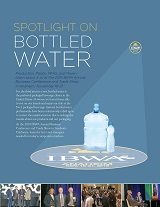A National Park Service (NPS) policy that allows individual parks to ban the sale of bottled water, but not other less-healthy drinks also packaged in plastic –– soft drinks, sports drinks, juice drinks, and other sugary packaged beverages –– denies park visitors the simple option of buying the healthiest packaged drink on the shelf, while at the same time making readily available a broad selection of unhealthy drinks packaged in heavier plastic bottles and which use more water to make.
According to NPS, since 2011, 18 of its 408 parks have banned the sale of bottled water with the stated intention of reducing the amount of plastic in its waste stream. Yet, there is zero evidence that any waste has been reduced. In fact, the U.S. Department of Interior found numerous shortcomings in NPS’s documentation, execution, monitoring, and verification – all requirements of NPS’ own directive for approving and implementing bottled water sales bans. NPS even admitted that none of its parks were tracking the number of plastic bottles in their waste streams or conducting the required analysis of the bans’ effects, hearing documents show.
Besides the issue of preventing park goers from being able to make basic healthy beverage purchases, new research shows these sort of sales bans have unintended negative consequences.
“The Unintended Consequences of Changes in Beverage Options and the Removal of Bottled Water on a University Campus,” published May 2015 in the American Journal of Public Health, concluded that a ban on the sale of bottled water at the University of Vermont (UVM) resulted in a 33 percent increase in the number of unhealthy sugary drinks shipped and a 6 percent increase in the number of bottles shipped to campus and thus entering the waste stream.
“We collected three semesters’ worth of detailed information about packaged beverage shipments to UVM’s campus before and after the implementation of the 30 percent healthy beverage requirement and the bottled water sales ban. The data showed that shipments of unhealthy, sugary drinks increased significantly when the option of bottled water was removed, while shipments of healthy beverages declined significantly. At the same time, the overall number of plastic bottles shipped to campus was not reduced,” said the study’s co-author Rachel K. Johnson, PhD, MPH, RD, Bickford Green and Gold Professor of Nutrition, University of Vermont.
“The results of the research that I, along with my co-author, conducted made clear that UVM’s decision to remove bottled water drove our students, faculty, staff, and visitors to purchase more unhealthy sugary drinks. At the same time, the number of plastic beverage containers shipped to campus did not decrease. This happened even though the university provided free reusable water bottles at campus events, retrofitted 68 water fountains to allow for the refilling of reusable water bottles, and conducted an educational campaign to inform students about the effort.
“As a professor of Nutrition at UVM, I took an interest in and decided to research what I saw as contradictory policies which required university dining facilities and vending machines to stock a 30 percent ‘healthy beverage’ ratio, but then banned the sale of one of the healthiest packaged beverages: bottled water.
“UVM banned bottled water sales in January 2013 for the same well-intentioned reasons as NPS, but unfortunately, the ban did not turn out as expected.”
Consumer marketing research supports this study’s finding. When asked what alternative beverage, if any, consumers would choose if their preferred choice of plain bottled water was not available, 63 percent of people said they would choose an unhealthy soda or other sugary drink, 7 percent would choose a bottled sparkling water or seltzer, 13 percent would not replace the bottled water at all, and only 16 percent said they would opt for tap water, she said.
“As with the NPS bottled water sales ban, the UVM policy was well-intentioned and meant to encourage our campus community to carry reusable water bottles that could be filled with tap water. At least during the semester when the ban was implemented, that did not happen.
“The bottled water sales ban in place in our national parks has the potential to have the same unintended consequences,” said Dr. Johnson.
Recently, the U.S. House of Representatives voted to prohibit the NPS from using any funds to implement or maintain bans on the sale of bottled water at any national park, which is a step in the right direction, she said.
“The Senate must still include and approve the provision in its Parks Service funding bill to end this misguided policy.”
“Our study shows that these sorts of policies, regardless of the motivation behind their adoption, may result in the consumption of more calories and more added sugars, a perpetuation of unhealthy dietary choices, and — ironically — an increase in plastic waste. Our study clearly suggests that the NPS bottled water sales ban has the potential to undermine efforts to encourage healthy food and beverage choices and may be environmentally counterproductive,” Dr. Johnson said.



























